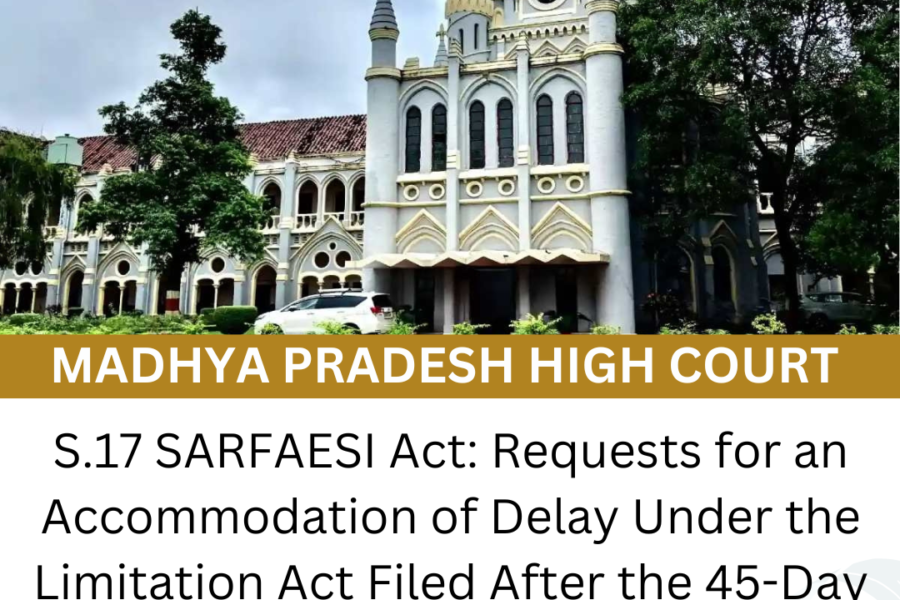Aniruddh Singh v. Authorized Officer, ICICI
Case Number: M.P. No.5324 OF 2023
The Madhya Pradesh High Court recently ruled that an application submitted to the Debt Recovery Tribunal (DRT) after the 45-day window under Section 17 of the Securitization and Reconstruction of Financial Assets and Enforcement of Security Interest Act, 2002 (“SARFAESI Act”) would be covered by Section 5 of the Limitation Act, which provides for the forgiveness of lateness.
Debtors have the option to contest the bank’s decisions under Section 17 of the SARFAESI Act, and there is a 45-day window in which to do so.
The Bench made up of Justices Sheel Nagu and Vivek Jain noted Section 29(2) of the Limitation Act, which states, among other things, that if the special law did not expressly exclude the application of Sections 4 to 24 of the Limitation Act (including Section 5), then the provisions of the Act would apply to all causes raised under the Special Law. “The special law, i.e. SARFAESI Act, does not expressly exclude the application of the provisions from Section 4 to 24 of the Limitation Act (including Section 5), and therefore the benefit u/S.5 of Limitation Act shall be available to the cause of action raised in an application u/S 17 of SARFAESI Act,” the bench noted.
Under Section 17 of the SARFAESI Act, the petitioner in this case filed an application challenging the demand, possession, and auction notices given in relation to the relevant secured assets. In addition, the petitioner filed a Section 5 of the Limitation Act application, requesting that the 46-day delay in preferring the same be excused. Based on the Apex Court’s ruling in Bank of Baroda & Anr. v. M/s Parasaadilal Tursiram Sheetgrah Pvt. Ltd. & Ors. (2022), the DRT denied the petitioner’s application, concluding that the application under Section 17 of the SARFAESI Act was in the nature of a suit and that, as a result, the provisions of Section 5 of the Limitation Act would not apply.
In this instance, the High Court determined that the Apex Court was not confronted with the issue of whether the Limitation Act’s provisions applied to a Bank of Baroda (Supra) application made in accordance with Section 17 of the SARFAESI Act. It concluded, therefore, that the DRT’s reliance on the aforementioned ruling was erroneous.
The Court noted that neither 6.5 Section 17 nor any other provision of the SARFAESI Act expressly excludes the operation of beneficial provisions under the Limitation Act, even though Section 17 did not grant DRT discretion to extend the 45-day period of limitation.
The Court further noted that Section 29(2) stipulates that, unless specifically excluded, Sections 4 through 24 of the Limitation Act shall apply to all causes brought under the special statute (the SARFAESI Act in this case). “…it is clear from a plain reading of the SARFAESI Act that this special Act does not specifically forbid the application of Section 5 of the Limitation Act, even if it prescribes a 45-day filing period under S.17(1). After considering the aforementioned points, it is clear that the provisions of Section 5 of the Limitation Act would be fully applicable and that applications filed after the 45 days under S.17(1) are eligible to petition the DRT for delay forgiveness.” the ruling stated. The request was thus allowed and the DRT was directed to consider and decide the application for condonation of delay filed by the petitioner.


Helpful, friendly, and always patient.
lisinopril for renal protection
They never compromise on quality.
Their online portal is user-friendly and intuitive.
where to buy cheap cipro prices
Their private consultation rooms are a great addition.
Quick turnaround on all my prescriptions.
how long does it take for gabapentin to relieve anxiety
I appreciate the range of payment options they offer.
Their commitment to global excellence is unwavering.
lisinopril pills online
A pharmacy that breaks down international barriers.
A harmonious blend of local care and global expertise.
gabapentin spinal surgery
Medicament prescribing information.
Wow! This is a cool platform. They really do have the quick deposits.